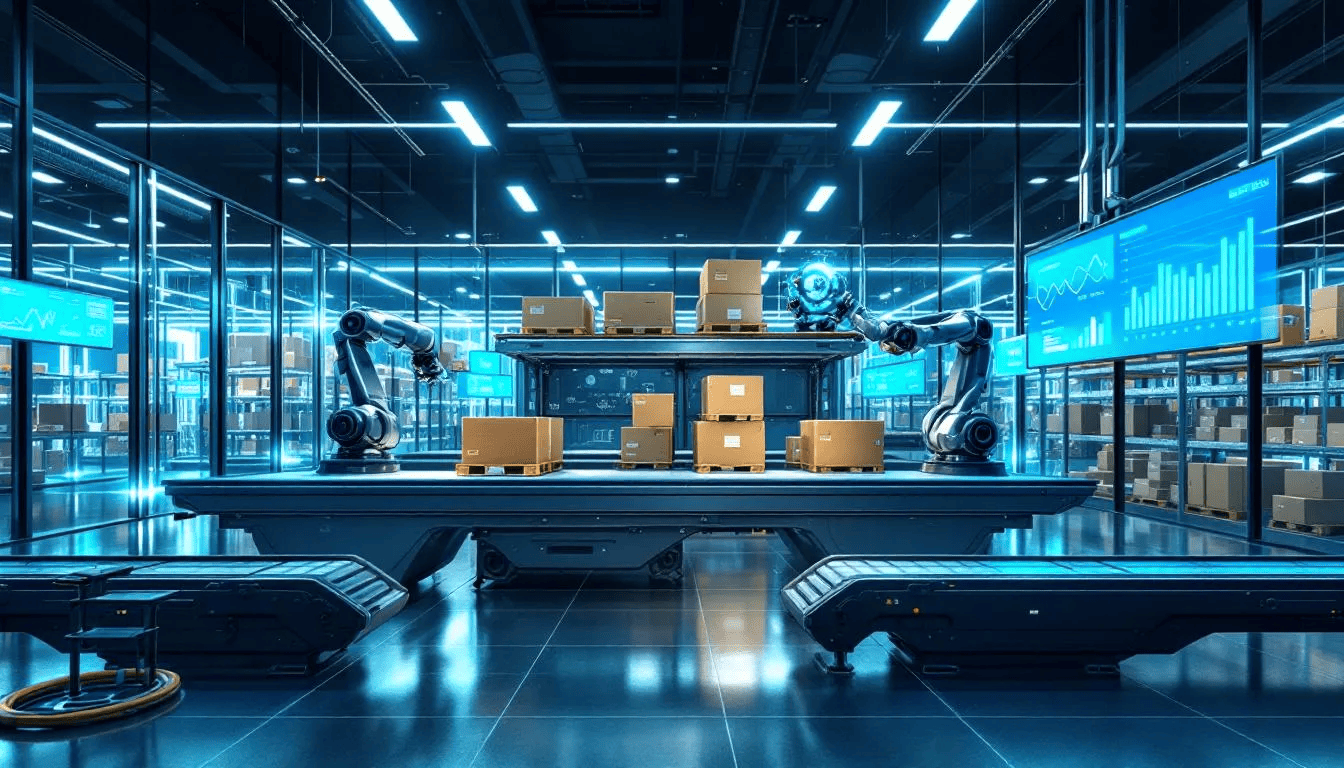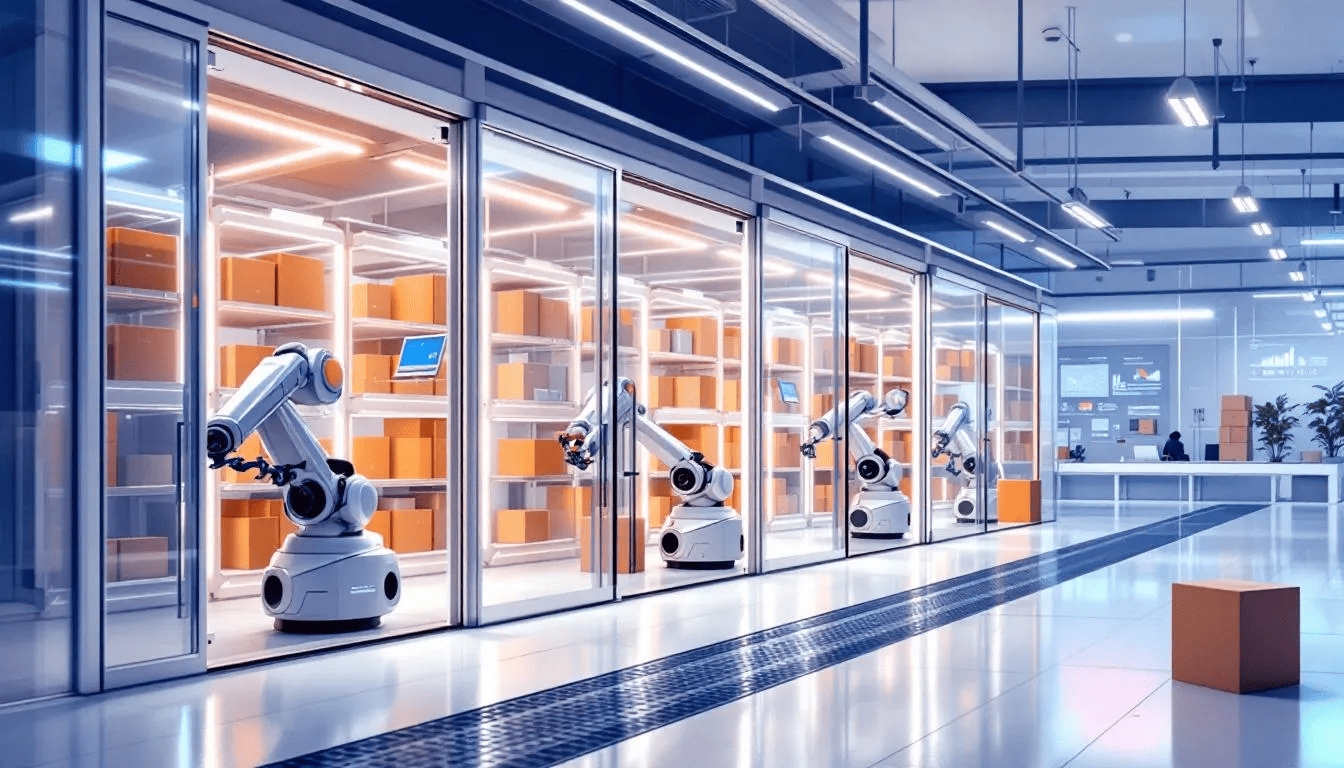AI in Self Storage: Enhancing Efficiency and Boosting Profits
Alexander Stasiak
Nov 13, 2025・12 min read
Table of Content
Key Takeaways
The Rise of AI in Self Storage
Smart Customer Interactions
Dynamic Pricing Strategies
Enhanced Security Measures
Operational Efficiency Through AI
Predictive Maintenance
Inventory Management and Control
Energy Consumption Optimization
AI Integration with Existing Systems
Data Analytics for Business Insights
Enhancing Customer Experiences
Overcoming Challenges in AI Adoption
Technical Integration
Investment Costs
Change Management
Regulatory and Ethical Considerations
Data Privacy and Protection
Human Oversight
Case Studies: Successful AI Implementation
Early Adopters Leading the Way
Real-World Applications
Summary
Frequently Asked Questions
How is AI enhancing customer interactions in self-storage?
What are the benefits of dynamic pricing strategies in self-storage?
How does AI improve security measures in self-storage facilities?
What are the challenges of integrating AI with existing systems in self-storage?
Why is human oversight important in AI applications for self-storage?
Artificial Intelligence is revolutionizing the self storage industry by optimizing operations, enhancing customer experiences, and driving profitability. For instance, 68% of UK self storage businesses already use AI to automate tasks and reduce costs. This article delves into the practical applications of AI in self storage, from dynamic pricing to improved security.
Key Takeaways
- AI integration in self-storage is enhancing operational efficiency through automation, dynamic pricing, and predictive maintenance.
- AI-driven customer interactions and smart chatbots are improving customer satisfaction by providing 24/7 support and personalized experiences.
- Implementing AI requires careful planning around technical integration, investment costs, and adherence to data privacy regulations to ensure successful adoption.
The Rise of AI in Self Storage

The self-storage industry is experiencing a seismic shift, driven by the integration of artificial intelligence. With the market projected to grow significantly, self-storage operators are increasingly turning to AI to stay competitive and meet the evolving demands of modern customers. In Europe, 69% of self-storage operators plan to implement AI technologies, while in the UK, 68% of businesses are already using AI.
Specialized AI solutions, designed specifically for self-storage, are preferred over generic tools because they offer better results due to their industry-specific design. These AI platforms come pre-trained with natural language processing capabilities tailored to industry terminology. As a result, self-storage operators can seamlessly integrate AI into their operations, enhancing efficiency and customer satisfaction.
Smart Customer Interactions
In today’s fast-paced world, customers expect instant service and personalized interactions. AI-powered chatbots are revolutionizing customer service in self-storage by automating responses to common inquiries, providing support around the clock. Up to 67% of initial inquiries in self-storage come through company websites, making digital interactions crucial. AI chatbots, trained on industry-specific terminology, streamline operations by addressing customers’ frequently asked questions efficiently.
These tools not only improve customer experiences but also offer insights into preferences and behaviors. Capturing and analyzing customer information allows AI to personalize interactions, making tailored recommendations that enhance satisfaction and loyalty. This data-driven decision-making approach gives self-storage operators a competitive edge in a crowded market.
Moreover, AI chatbots reduce the workload on call center staff, allowing human intervention only when necessary. This ensures that customer interactions maintain a human touch while benefiting from the efficiency of AI. With ongoing technological advancements, AI-powered customer interactions will increasingly become the preferred solution for enhancing customer experiences and streamlining operations in self-storage businesses, including handling phone calls.
Dynamic Pricing Strategies
Pricing strategies in self-storage have traditionally been static, often failing to reflect real-time market conditions. AI is changing this by enabling self-storage operators to adjust prices dynamically based on demand patterns and competition. AI-powered pricing platforms analyze vast amounts of data, providing self-storage operators with the insights needed to optimize pricing strategies and maximize revenue.
Through predictive analytics, AI can forecast demand and adjust prices accordingly, ensuring that self-storage businesses remain competitive and profitable. This data-driven decision-making approach not only boosts revenue but also helps in reducing operational costs by optimizing the allocation of storage units.
As a result, self-storage operators can respond swiftly to market changes, offering competitive pricing that attracts and retains customers in the self storage business.
Enhanced Security Measures
Security is a top priority for self-storage facilities, and AI is playing a pivotal role in enhancing security measures. AI-enabled surveillance systems can monitor activities in real-time, instantly detecting and responding to suspicious activity. For example, 10 Federal Storage uses AI to differentiate between normal and suspicious activities, promptly addressing potential threats.
Facial recognition technology is also being increasingly adopted to improve access control at self-storage facilities. This technology not only enhances security but also contributes to a seamless customer experience by allowing quick and secure access to storage units.
Additionally, security drones equipped with AI-enabled cameras and motion sensors provide an added layer of security, monitoring large areas efficiently and effectively. These advanced security measures give customers peace of mind, knowing that their sensitive items are well-protected.
Operational Efficiency Through AI

Artificial intelligence is a game-changer when it comes to operational efficiency in self-storage. By automating routine tasks, AI allows staff to focus on more strategic activities, significantly enhancing overall facility performance. Self-storage operators are increasingly adopting AI tools to streamline operations, reduce operational costs, and enhance customer experiences.
From billing and inventory management to customer service, AI systems are transforming how self-storage facilities operate. The implementation of AI not only leads to substantial cost savings but also ensures smoother transitions by minimizing disruptions to existing workflows.
AI is making a significant impact on operational efficiency in several key areas through artificial intelligence ai models.
Predictive Maintenance
Predictive maintenance is one of the most valuable applications of AI in self-storage. By utilizing AI to predict potential failures in equipment, facilities can schedule necessary maintenance ahead of time, significantly reducing the risk of unexpected downtime. AI-driven predictive maintenance systems analyze data from sensors installed on equipment, allowing for a proactive approach to maintenance.
This proactive approach not only enhances facility performance but also leads to substantial cost savings by avoiding costly emergency repairs and service interruptions, including potential failures. By adopting predictive maintenance strategies, self-storage operators can ensure continuous service delivery and maintain high levels of customer satisfaction, with facility operation supported.
Inventory Management and Control
Efficient inventory management is crucial for the success of any self-storage facility. AI algorithms assist in optimizing the allocation of storage units based on size and location, ensuring that space is utilized effectively. The right self-storage software can automate tasks, improve customer service, and give operators better control over their operations through self storage automation.
For example, 10 Federal Storage has reduced its employee-per-facility ratio from the industry norm of 1.8-2.0 to 0.8 through AI automation. This reduction in staffing needs cuts operational costs and enhances overall facility performance and facility operation.
Implementing AI-driven solutions allows self-storage businesses to streamline operations, reduce costs, and promote growth.
Energy Consumption Optimization
Energy consumption is a significant operational cost for self-storage facilities, and AI is helping to optimize it. AI-driven systems contribute by:
- Monitoring conditions within storage units through automated climate control systems
- Adjusting environmental settings in real-time to enhance energy efficiency
- Reducing energy consumption by implementing energy-saving protocols based on real-time data
By analyzing energy use patterns, AI systems can suggest adjustments to further reduce operational costs. This not only leads to substantial cost savings but also contributes to environmental sustainability. Operators adopting AI-driven energy optimization can gain a competitive edge through enhanced operational efficiency and lower energy expenses.
AI Integration with Existing Systems

Integrating AI with existing systems is a critical step for self-storage operators looking to leverage the full potential of artificial intelligence. The process often involves addressing compatibility issues and ensuring data quality during migration. Despite these challenges, the benefits of AI integration are substantial, enhancing operational efficiency and decision-making.
Operators must approach AI adoption strategically, starting slowly and evaluating specific business needs before full-scale implementation. By doing so, self-storage businesses can minimize disruptions and ensure a smoother transition to AI-driven operations.
Key aspects of AI integration and its impact on self-storage facilities will be explored.
Data Analytics for Business Insights
Data analytics is at the heart of AI’s transformative power in self-storage. AI algorithms analyze data, turning it into actionable business insights that empower operators to make informed decisions. This capability provides a significant competitive advantage, allowing self-storage businesses to identify trends, optimize operations, and enhance customer experiences.
The success of AI in data analytics relies heavily on clean, organized data and consistent formats for optimal results. Digital key logs, for example, can provide real-time business insights, enabling operators to monitor operations and make instant improvements.
Leveraging data analytics allows self-storage operators to stay competitive and drive business growth.
Enhancing Customer Experiences
Enhancing customer experiences is a primary goal for any self-storage operator, and AI plays a crucial role in achieving it. AI-driven chatbots provide around-the-clock customer support, ensuring that customers receive timely assistance whenever they need it. This 24/7 availability significantly improves customer satisfaction and loyalty.
AI also personalizes interactions based on user preferences and history, offering tailored recommendations and services that enhance customer experiences. By streamlining operations and reducing operational costs, AI helps self-storage businesses deliver superior customer service, giving them a competitive edge in the market.
Overcoming Challenges in AI Adoption

Adopting AI in self-storage comes with its own set of challenges, but the rewards are well worth the effort. Self-storage operators must navigate technical, financial, and human resource challenges to successfully integrate AI into their operations. Strategic planning and investment are crucial for overcoming these obstacles and realizing the full potential of AI.
Effective change management is essential, involving clear communication and training programs to alleviate employee concerns and foster a culture of innovation. Addressing these challenges head-on enables self-storage businesses to gain competitive advantages and operational improvements through AI adoption.
Technical Integration
Technical integration is one of the most complex aspects of AI adoption. Self-storage operators often face challenges due to outdated technology infrastructure and data migration requirements. Addressing these integration issues may involve investing in the modernization of existing systems and thorough data management planning.
Navigating these complexities is crucial for gaining the competitive advantages that AI systems offer. Successful AI integration allows self-storage businesses to streamline operations, enhance customer experiences, and achieve significant efficiencies.
Investment Costs
Investment costs are a major consideration for self-storage operators looking to adopt AI. The financial implications include:
- Costs for software licensing
- Hardware infrastructure
- Staff training Operators must carefully weigh these investment costs against the expected benefits of AI technology.
Despite the significant financial outlay, the long-term benefits of AI adoption, such as reducing operational costs and enhancing operational efficiency, make it a worthwhile investment. By strategically planning their AI investments, self-storage businesses can achieve substantial cost savings and improved profitability.
Change Management
Change management is critical for the successful adoption of AI in self-storage. Effective training and clear communication about AI’s role in augmenting jobs are crucial to alleviating employee concerns. Fostering a culture of innovation and addressing job displacement concerns ensures a smooth transition to AI-driven operations.
Additionally, involving employees in the AI adoption process and highlighting the benefits of AI for enhancing customer experiences and operational efficiency can help gain their support and cooperation. A well-managed change process will enable self-storage businesses to fully leverage the advantages of AI while maintaining a motivated and engaged workforce.
Regulatory and Ethical Considerations
Adopting AI in self-storage also involves navigating regulatory and ethical considerations. Legal compliance is crucial, as it influences how self-storage operators manage customer data and communicate with customers. Ensuring fairness and accountability in AI applications is essential to maintain consumer trust and adhere to industry standards.
Ethical issues also play a critical role in AI implementation. Self-storage businesses must ensure that their AI systems operate transparently and ethically, respecting customer privacy and data protection laws. By addressing these regulatory and ethical considerations, self-storage operators can build trust and credibility with their customers.
Data Privacy and Protection
Data privacy and protection are paramount in the self-storage industry, especially with the increasing use of AI. Self-storage operators must be aware of their legal obligations concerning customer data, particularly with regulations like GDPR and CCPA. Implementing robust data protection strategies is essential to prevent unauthorized access to customer information.
Compliance with data protection laws not only helps self-storage businesses avoid significant financial penalties but also enhances customer trust and loyalty. By prioritizing data privacy and protection, self-storage operators can ensure that their AI systems operate ethically and responsibly.
Human Oversight
Despite the advancements in AI technology, human oversight remains crucial for maintaining ethical standards and ensuring the integrity of AI decision-making processes. Self-storage operators must ensure that human judgment is integrated into critical AI decisions to mitigate risks associated with automated decision-making.
Maintaining human oversight allows self-storage businesses to address potential ethical concerns and enhance accountability. This approach ensures that AI applications in self-storage are used responsibly, balancing the benefits of automation with the need for ethical and transparent practices.
Case Studies: Successful AI Implementation

Real-world case studies provide valuable insights into the successful implementation of AI in self-storage. European self-storage operators are leading the way, with 69% planning to implement AI technologies. These early adopters have achieved significant competitive advantages and operational improvements through AI adoption.
For example, 10 Federal Storage has implemented AI in their operations, achieving enhanced security measures and streamlined processes. Drones equipped with AI-enabled cameras are used for real-time monitoring, significantly improving security and operational efficiency.
These case studies highlight the tangible benefits of AI in self-storage, serving as a blueprint for other operators looking to adopt similar technologies.
Early Adopters Leading the Way
Early adopters of AI in self-storage have seen notable benefits, including improved operational efficiency and customer experiences. For example, 10 Federal has reduced its staff by 25% through AI utilization, demonstrating significant efficiency improvements. SteelBlue aims to streamline its operations through AI, focusing on strategic prioritization and client service enhancement.
In the UK, approximately 68% of self-storage businesses are integrating AI into their operations, gaining a competitive edge in the market. These industry leaders are leveraging AI technologies to stay ahead and meet the evolving demands of modern customers, showcasing the proactive approach needed to thrive in the self-storage industry.
Real-World Applications
Real-world applications of AI in self-storage showcase its transformative impact. At 10 Federal, 80% of customer inquiries are automated, enabling quicker responses and reduced labor costs. Digital keys are replacing traditional ones, offering a more secure and convenient access method for customers.
AI applications significantly improve operational efficiency, leading to better customer experiences and streamlined processes. As technology continues to evolve, these real-world examples highlight how AI is revolutionizing the self-storage industry, setting a new standard for operational excellence and customer satisfaction.
Summary
The integration of AI in self-storage is transforming the industry, offering numerous benefits such as enhanced operational efficiency, improved customer experiences, and optimized pricing strategies. By adopting AI-driven solutions, self-storage operators can stay competitive, meet the evolving demands of modern customers, and achieve significant cost savings.
As the self-storage market continues to grow, embracing AI technologies will be crucial for operators looking to stay ahead. By addressing the technical, financial, and ethical challenges of AI adoption, self-storage businesses can fully leverage the potential of AI to drive business growth and deliver exceptional customer service. The future of self-storage is bright, and AI is leading the way.
Frequently Asked Questions
How is AI enhancing customer interactions in self-storage?
AI is enhancing customer interactions in self-storage by utilizing chatbots that offer round-the-clock support, automate responses to frequently asked questions, and tailor interactions to individual preferences, thus boosting satisfaction and efficiency.
What are the benefits of dynamic pricing strategies in self-storage?
Dynamic pricing strategies in self-storage enhance revenue by allowing operators to adjust prices in real-time according to demand patterns and competition, ultimately leading to more effective cost management. This approach ensures that pricing remains competitive while maximizing profitability.
How does AI improve security measures in self-storage facilities?
AI significantly enhances security in self-storage facilities through real-time surveillance, which allows for instant detection of suspicious activities, as well as the implementation of facial recognition technology and security drones for improved access control. This ensures a safer environment for customers and their belongings.
What are the challenges of integrating AI with existing systems in self-storage?
Integrating AI with existing self-storage systems poses challenges such as compatibility issues, data migration complexities, and the need to modernize outdated technology infrastructure. Effectively addressing these obstacles is essential to fully leverage AI's competitive advantages.
Why is human oversight important in AI applications for self-storage?
Human oversight is crucial in AI applications for self-storage as it ensures ethical use and integrity in decision-making, thereby mitigating risks associated with automation. It strikes a balance between leveraging technology and maintaining responsible practices.
Digital Transformation Strategy for Siemens Finance
Cloud-based platform for Siemens Financial Services in Poland


You may also like...

Gen AI and AI Difference
AI and GenAI are often used as the same term, but they solve different problems. This guide explains the difference, shows real examples, and helps you choose the right approach for your projects.
Alexander Stasiak
Jan 09, 2026・12 min read

How Is AI Used in Entertainment
Artificial intelligence is transforming entertainment, from content creation and recommendations to gaming, marketing, and audience engagement. Today, AI shapes how media is produced, discovered, and experienced across platforms.
Alexander Stasiak
Jan 13, 2026・8 min read

Simplifying Self Storage: How Website Software Solutions Streamline Unit Availability Management
Website software solutions bring automation, real-time updates, and user-friendly tools to keep your units booked and your operations stress-free.
Alexander Stasiak
Nov 02, 2025・9 min read




